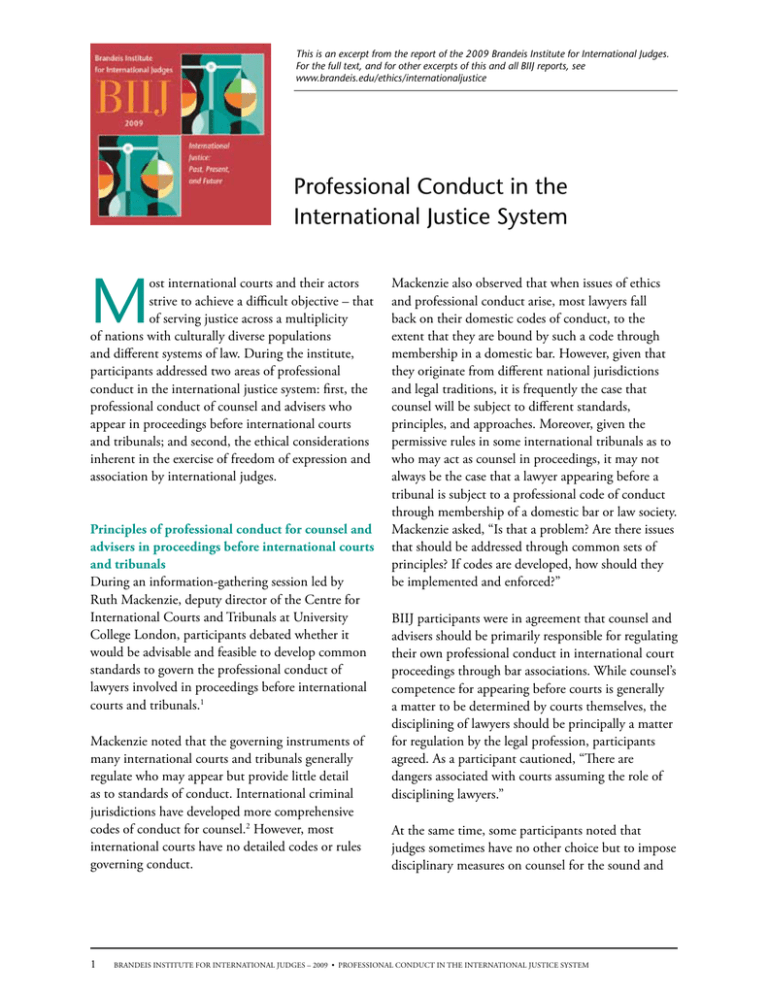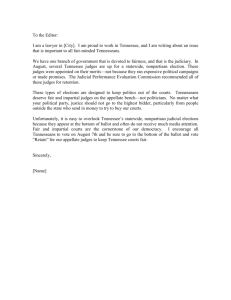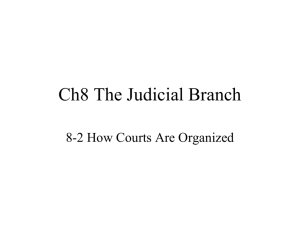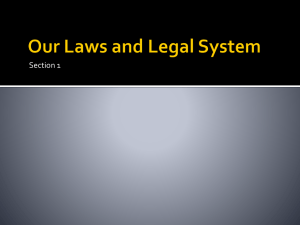Document 14435550
advertisement

This is an excerpt from the report of the 2009 Brandeis Institute for International Judges. For the full text, and for other excerpts of this and all BIIJ reports, see www.brandeis.edu/ethics/internationaljustice Professional Conduct in the International Justice System M ost international courts and their actors strive to achieve a difficult objective – that of serving justice across a multiplicity of nations with culturally diverse populations and different systems of law. During the institute, participants addressed two areas of professional conduct in the international justice system: first, the professional conduct of counsel and advisers who appear in proceedings before international courts and tribunals; and second, the ethical considerations inherent in the exercise of freedom of expression and association by international judges. Principles of professional conduct for counsel and advisers in proceedings before international courts and tribunals During an information-gathering session led by Ruth Mackenzie, deputy director of the Centre for International Courts and Tribunals at University College London, participants debated whether it would be advisable and feasible to develop common standards to govern the professional conduct of lawyers involved in proceedings before international courts and tribunals.1 Mackenzie noted that the governing instruments of many international courts and tribunals generally regulate who may appear but provide little detail as to standards of conduct. International criminal jurisdictions have developed more comprehensive codes of conduct for counsel.2 However, most international courts have no detailed codes or rules governing conduct. 1 Mackenzie also observed that when issues of ethics and professional conduct arise, most lawyers fall back on their domestic codes of conduct, to the extent that they are bound by such a code through membership in a domestic bar. However, given that they originate from different national jurisdictions and legal traditions, it is frequently the case that counsel will be subject to different standards, principles, and approaches. Moreover, given the permissive rules in some international tribunals as to who may act as counsel in proceedings, it may not always be the case that a lawyer appearing before a tribunal is subject to a professional code of conduct through membership of a domestic bar or law society. Mackenzie asked, “Is that a problem? Are there issues that should be addressed through common sets of principles? If codes are developed, how should they be implemented and enforced?” BIIJ participants were in agreement that counsel and advisers should be primarily responsible for regulating their own professional conduct in international court proceedings through bar associations. While counsel’s competence for appearing before courts is generally a matter to be determined by courts themselves, the disciplining of lawyers should be principally a matter for regulation by the legal profession, participants agreed. As a participant cautioned, “There are dangers associated with courts assuming the role of disciplining lawyers.” At the same time, some participants noted that judges sometimes have no other choice but to impose disciplinary measures on counsel for the sound and Brandeis Institute for International Judges – 2009 • professional conduct in the international justice system orderly administration of justice, a practice that has occurred most especially in criminal jurisdictions. For example, they occasionally need to address abuse of process, non-compliance with orders on the production of documents, or abusive language in courtrooms. In cases of serious misconduct, judges may sometimes avail themselves of the power of contempt of court. Therefore, international courts might need more guidance on the nature of sanctions to be imposed, according to a participant. “Any working group should examine or recommend sanctions to apply to various levels of misconduct.” minimal standards of conduct for counsel appearing before international courts to ensure uniformity and consistency. Although the rules of conduct and methods of enforcement are often similar from one country to another, their differences may sometimes be too important to ignore. Participants asked: When rules of conduct conflict, which one should prevail? Another suggested that in order to harmonize rules of professional conduct, each bar or law society, at the national or international level, should treat violations of other associations’ rules as violations of their own rules. Would it be desirable and possible to devise one single self-regulating body of counsel and advisers appearing before international justice institutions? Given the diversity and specialty of international tribunals, some questioned the feasibility of such a plan. Instead, national bar associations should be encouraged to develop codes that could apply universally, in the view of some participants. Other associations with a broader mandate and geographical scope, such as the International Bar Association and the International Association of Lawyers, should also be included in these efforts, according to another participant. Participants agreed that one particular issue of professional conduct seems to require immediate attention – post-service limitations for former judges and legal staff of international justice institutions. Several participants expressed concern about former judges appearing as counsel before benches that they had previously occupied or before former fellow judges. One opined, “It creates an appearance of fundamental unfairness that seriously affects the credibility of courts.” Many participants from across the international judicial spectrum also took issue with former legal staff turning around to represent parties or to act as counsel for prosecution or defense before the court for which they had previously worked. Institute participants agreed that legal staff, like judges, should be subject to post-service limitations such as a mandatory “cooling-off” period. BIIJ participants then wondered whether the jurisdiction of home bar associations should be extended to allow them to discipline professional misconduct occurring in international courts. There was disagreement on this matter. Several opined that international justice institutions should be able to refer disciplinary matters back to national bar associations, while others questioned the suitability of this option, explaining that home bar associations had often only reluctantly cooperated with international jurisdictions. A participant reported that his court had decided to refer disciplinary matters back to home bar associations but subsequently never heard back from them. “If cases are referred back to home bar associations, does it matter if these associations do not apply the same rules or standards?” inquired Mackenzie. The majority appeared to agree that there should be 2 What should be the duration, then, of such “coolingoff” periods for former judges and legal staff of international jurisdictions? The practice directions of the ICJ suggest a three-year restriction period for former judges as well as for the “registrar, deputyregistrar or higher official of the Court” (see sidebar, page 28). The Burgh House Principles on the Independence of the International Judiciary also recommend a three-year restriction period for former international judges as a “benchmark” (see sidebar, page 28). It was also noted that in some domestic jurisdictions, judges cannot appear for a period of ten years before a court on which they had previously served. Other jurisdictions impose a lifetime restriction on appearance before one’s former court. Brandeis Institute for International Judges – 2009 • professional conduct in the international justice system Post-Service Limitations (“Cooling-Off” Period) for Former Judges and Legal Staff Practice Directions of the International Court of Justice, adopted in October 2001, as amended on 20 January 2009. Practice Direction VIII The Court considers that it is not in the interest of the sound administration of justice that a person who until recently was a Member of the Court, judge ad hoc, Registrar, Deputy‑Registrar or higher official of the Court (principal legal secretary, first secretary or secretary), appear as agent, counsel or advocate in a case before the Court. Accordingly, parties should refrain from designating as agent, counsel or advocate in a case before the Court a person who in the three years preceding the date of the designation was a Member of the Court, judge ad hoc, Registrar, Deputy-Registrar or higher official of the Court. http://www.icj-cij.org/documents/index.php?p1=4&p2=4&p3=0&lang=en The Burgh House Principles on the Independence of the International Judiciary, adopted by the International Law Association Study Group on the Practice and Procedure of International Courts and Tribunals, in association with the Project on International Courts and Tribunals, 2004. Principle 13.3 Former judges shall not act as agent, counsel, adviser or advocate in any proceedings before the court on which they previously served for a period of three years after they have left office or such other period as the court may establish and publish. http://www.ucl.ac.uk/laws/cict/docs/burgh_final_21204.pdf While some participants argued in favor of a lifetime restriction for the international judiciary, others would prefer less stringent limitations depending on the circumstances. For example, a participant stated, “In my court, judges are appointed for fouryear terms. Should they give up for the rest of their lives the possibility of appearing before that court?” Others pointed out that post-service limitations should not disproportionately affect the capacity of former judges to earn a living after their judicial mandate, especially if these individuals still need to be active in the labor market or if pension funds are not available to them. It was noted that some international courts authorize former judges to appear before them immediately after leaving the bench provided that they do not argue the cases that they had been previously assigned or those that were pending during their term of office. Participants agreed that reasonableness and proportionality should dictate the terms and duration 3 of any post-service limitation, including “coolingoff” periods. Since the possibility of influencing former colleagues decreases with time, life bans would seem disproportionate in most cases. Three years of appearance limitation can be excessive for courts where judges are appointed for short terms of office. However, one participant asked skeptically, “Does a limitation on appearance before courts seriously undermine the possibility of making a living as a consultant or adviser, for example? It does not prevent earning a living.” Ethical considerations by international judges in the exercise of their freedom of expression and association During an informal evening session, participants wrestled with the question of how international judges can balance their individual right to freedom of expression and association on the one hand, and the interests of international justice on the other. In other words, how can judges best reconcile these Brandeis Institute for International Judges – 2009 • professional conduct in the international justice system personal freedoms with their public judicial function without affecting their independence and impartiality (see sidebar, right)? Participants answered this question by weighing several hypothetical dilemmas in a lively, frank, and open manner. Participants first discussed whether they should refrain from attending certain social events in order to preserve their neutrality. For example, is there an appearance of impropriety if a judge attends a gathering for a friend whom he has known since law school and who is now running for a national executive office? Would there be ethical concerns if a judge from a regional human rights court, previously in the diplomatic service, spends a holiday week with the family of his country’s foreign minister? What if a small private dinner at the home of a judge of an international criminal court includes the deputy prosecutor of that court? Should a judge from a regional court decline an invitation to attend a symposium on global climate change if other attendees include senior executives of multinational corporations that have appeared before his court? Participants also pondered whether judges can associate with certain organizations, such as fraternal orders, without compromising their appearance of impartiality. Participants additionally broached possible restrictions on their capacity to express personal views in public gatherings or events. For example, does an international judge display bias by speaking at the celebration of the 50th anniversary of a human rights association with which he has been associated for years? Participants also discussed whether international judges should generally abstain from making regular contributions to online blogs on general issues of punishment, prosecution policy, gender discrimination, and other matters. While there was general agreement on how to handle these hypothetical cases, there were enough differences of opinion to suggest that a fundamental judicial concept like “independence,” and a term like “freedom of association,” do not hold objectively and 4 universally defined semantic values but are instead open to some individual interpretation on the part of judges. Even those international courts that have a judicial code of conduct are bound to encounter situations where the boundary between acceptable and unacceptable behavior is debatable. What remained unquestionable, however, was the necessity for judges to maintain the appearance of impartiality at all times.34 This necessity may often outweigh judges’ individual rights to freedom of expression and association. When the boundary between acceptable and unacceptable behavior is unclear, the general practice of international judges is to seek advice from peers and from the president of their respective courts on how best to preserve the integrity of the judicial function. Therefore, participants appeared to agree that, in case of doubt, one should generally abstain from engaging in the public forum of ideas or in other social events or organizations until the matter is fully discussed with colleagues. Furthermore, since most international courts serve justice to a multiplicity of nations, each with its own understanding of judicial ethics, perhaps the necessity for judges to discuss ethical quandaries with peers is felt more acutely in the international justice system than in domestic ones. The Burgh House Principles on the Independence of the International Judiciary, adopted by the International Law Association Study Group on the Practice and Procedure of International Courts and Tribunals, in association with the Project on International Courts and Tribunals, 2004. Principle 7.1 Judges shall enjoy freedom of expression and association while in office. These freedoms must be exercised in a manner that is compatible with the judicial function and that may not affect or reasonably appear to affect judicial independence or impartiality. http://www.ucl.ac.uk/laws/cict/docs/burgh_ final_21204.pdf Brandeis Institute for International Judges – 2009 • professional conduct in the international justice system Notes Mackenzie outlined the initiative of the International Law Association Study Group on the Practice and Procedure of International Tribunals, which is co-chaired by Professor Philippe Sands QC (University College London), Professor Campbell MacLachlan (Victoria University Wellington), and Professor Laurence Boisson de Chazournes (University of Geneva). Further information on the Study Group’s work will appear on the website of the Centre for International Courts and Tribunals, at: http://www.ucl.ac.uk/laws/cict. 1 2 See, for instance, the Code of professional conduct for counsel appearing before the international tribunal (ICTY), as amended on 12 July 2002 and 29 June 2006 (IT/125 REV. 2), available at http://www.icty. org/sections/LegalLibrary/Defence. See also the Code of Professional Conduct for Defense Counsel, ICTR, 14 March 2008, and Prosecutor’s Regulation No. 1 of 1999, Prosecutor’s Regulation No. 2 of 1999 and Prosecutor’s Regulation No. 1 of 2005 (ICTY/ICTR), available at: http://www.unictr.org/default.htm (“Basic Legal Texts”). See, further, the ICC Code of Professional Conduct for Counsel, ICC-ASP/4/Res,1, adopted on 2 December 2005, and entered into force on 1 January 2006, available at: http://www.icc-cpi.int/Menus/ICC/Legal+Texts+and+Tools/ Official+Journal/Code+of+Professional+Conduct+for+counsel+_.htm. However, Mackenzie indicated that given that specific codes have already been developed for the international criminal tribunals, it is not proposed initially to include them within the scope of the Study Group’s work. Nonetheless, experience with the application of such codes may provide useful guidance to the development of general principles. INTERNATIONAL CENTER for ETHICS, JUSTICE, and PUBLIC LIFE Brandeis University Brandeis University MS 086 P.O. Box 549110 Waltham, MA 02454-9110 USA (781) 736-8577 www.brandeis.edu/ethics 5 Brandeis Institute for International Judges – 2009 • professional conduct in the international justice system



